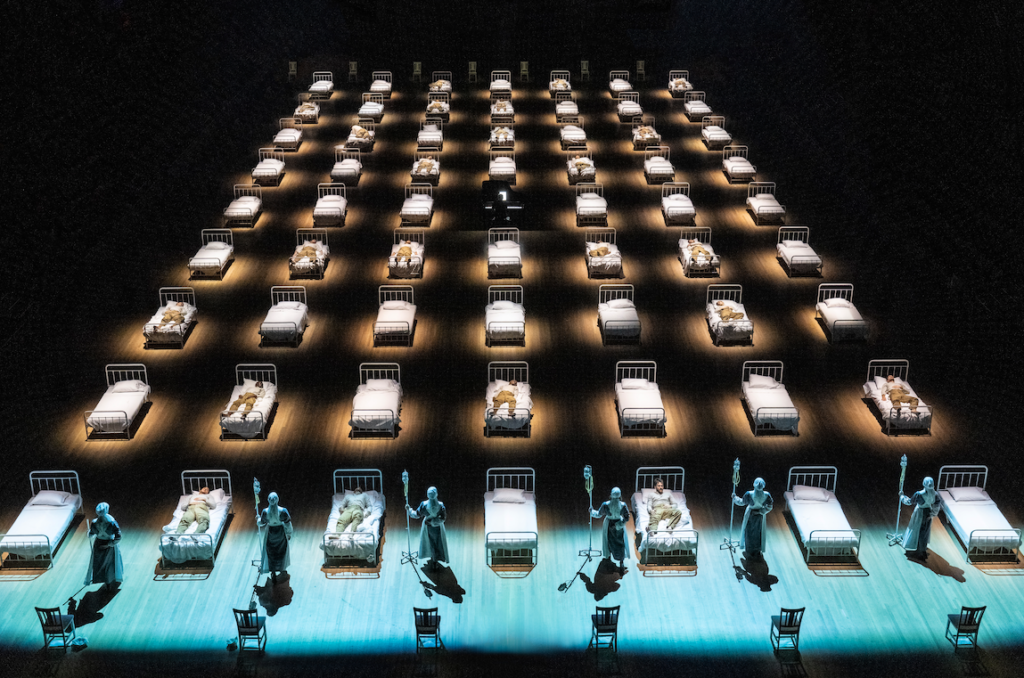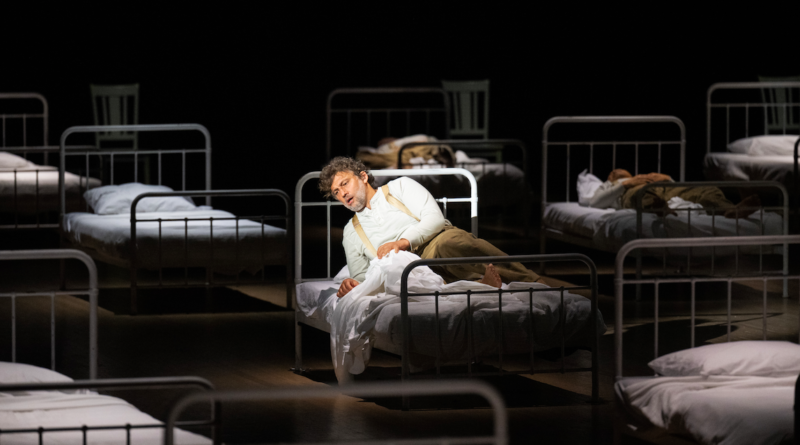REVIEW: Ghostly ‘Doppelganger’ features breathtaking imagery
Photo: Jonas Kaufmann stars in Doppelganger, a new opera set to the music of Franz Schubert. Photo courtesy of Monika Rittershaus / Provided by Park Avenue Armory with permission.
NEW YORK — When director Claus Guth, tenor Jonas Kaufmann and pianist Helmut Deutsch have a collective idea, the world should listen.
The trio of impressive artists was commissioned by Park Avenue Armory, one of the most important cultural institutions in New York City, to give new life to Franz Schubert’s final composition, Schwanengesang. They took this work, translated appropriately to Swan Song, and built an impressive production about a soldier facing the deadly consequences of battle. Their operatic story, which played to sold-out audiences through Thursday, Sept. 28, filled the gargantuan space of the armory, offering audiences a unique chance to see the ghostly inner-workings of a military hospital, where both pain and memory collide on a constant basis.
Kaufmann, one of the preeminent opera singers in the world, carries the heavy load for the 90-minute work, singing every note and emoting the story of this central figure, a soldier seemingly lost in the infirmary. He’s physically hurt and mentally fatigued. Memories of conflict plague his mind, and he seems confused amidst the maze of beds that surround his broken body. He’s joined by other fallen soldiers, all tended to by nurses who cascade through the corridors of the staging area.
Sitting at the center of the military maelstrom is Deutsch at the piano. He first welcomes the crowd into the Park Avenue Armory by hitting a series of haunting notes on his instrument. Occasionally he even hits his hands on the underside of the piano, producing a strange beckoning sound, something between a knock and a tolling bell. At one point in the evening, the soldiers assemble around him, as if he were keeping company at a fireside chat, and he provides a Schubert solo that is pitch-perfect and utterly beautiful.
Guth’s vision is simultaneously focused and immense. He’s able to achieve intimacy without losing the grandeur of the great hall. His most striking choice is the positioning of the hospital beds, which are laid out to mathematical precision like a chessboard. Michael Levine, his set designer, deserves credit for the design elements, which pair so nicely with the emotional story being told. These beds are thrown asunder throughout the evening. They become a means of blockade and serve as visual reminders for the war that took these men’s innocence away.
Taken together, Kaufmann, Deutsch and Guth have a shared inventiveness when telling this story. Voice, instrument and direction mold together with such symmetry and complement that Doppelgänger amazes the audience with profundity and sorrow. This trio has something to say, and together they collectively utter their cries and perspectives, to the benefit and remorse of the theatergoers who are seated on either side of the action, as if the military hospital were a football field.
Doppelganger, which had a scandalously short run, lingers long in the mind for those lucky few who grabbed a ticket to the sold-out performances. The show, set to the touching and powerful music of Schubert, offers an important viewpoint on warfare and how the pain of conflict continues long after the final gunshots.
By John Soltes / Publisher / John@HollywoodSoapbox.com
Doppelganger, directed by Claus Guth, features tenor Jonas Kaufmann and pianist Helmut Deutsch. Performances at Park Avenue Armory ended Thursday, Sept. 28. Click here for more information.



Thank your such an detailed review of an amazing experience. I have followed Jonas Kaufmann for about 10 years, mostly his opera performances, also Lieder with Prof. Deutsch. This was l, for me, one of the most memorable, deeply moving event. Having memories of WWll as a child, it touch my soul.
Es scheint Wunderbares zu sein, was diese 4 Künstler auf die Beine gestellt haben, mit großer österreichischer Beteiligung !